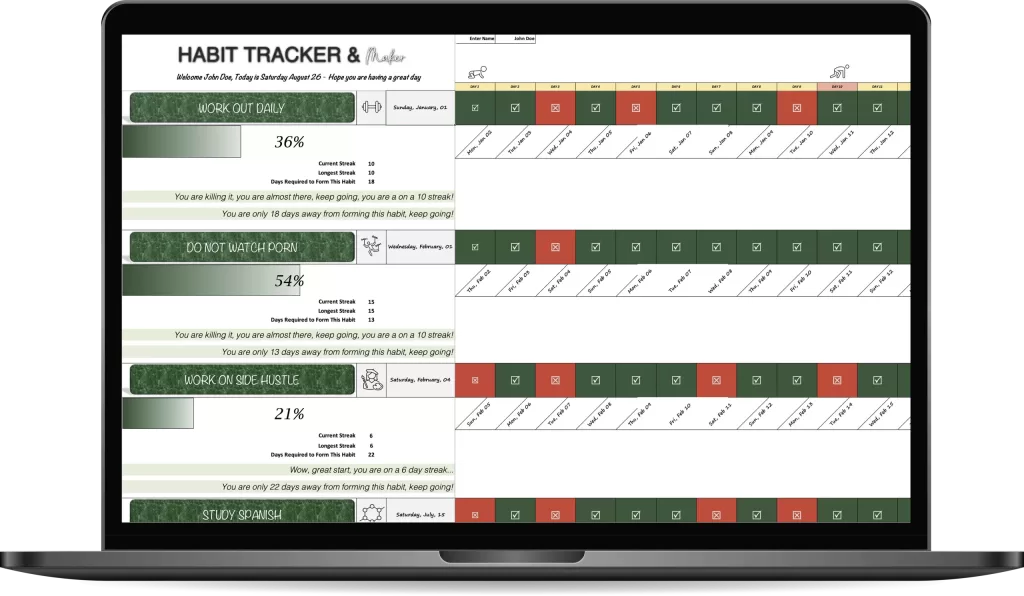Table of Contents
Specificity in Goals is Gold
Embrace the Power of Baby Steps
Relentless Regularity
Timely Triggers
Progress in Pixels
Milestone Merriments
Habitual Harmony
Knowledge Nurtures Habits
Visionary Victory
Constructive Course-Correction
Fluidity in Formulation
Post 28: Progress & Propel
The journey to self-improvement often starts with a single step, yet an alarming 80% of such efforts dissolve by February, as noted by U.S. News & World Report. The crux of the matter? Many falter in discerning how to develop good habits and make them stick. Interestingly, while a study in the European Journal of Social Psychology suggests it may take up to 66 days to solidify a habit, the foundational 28 days are crucial. Here’s a revamped guide to craft a blueprint for success:
1. Specificity in Goals is Gold
When venturing into how to develop good habits, clarity is your best ally. A research study from the Dominican University of California indicates that well-defined goals drastically uplift success rates. Swap “I want to be more active” with “I’ll commit to a 30-minute walk at 7 am daily.”
2. Embrace the Power of Baby Steps
In the pursuit of building lasting habits, enthusiasm is great, but the Journal of Consumer Research affirms that starting small fosters prolonged commitment.
3. Relentless Regularity
Consistency isn’t just a buzzword; it’s the foundation of how to develop good habits. Regular, dedicated practice is vital, as emphasized by the European Journal of Social Psychology.
4. Timely Triggers
Harnessing reminders accelerates habit formation, as highlighted in the Personality and Social Psychology Bulletin. These cues act as consistent nudges on your habit journey.
5. Progress in Pixels
Charting your journey plays a pivotal role in ensuring habits stick. Be it an app, a manual calendar, or my very own “Excel Habit Tracker“, visual tracking amplifies commitment, as showcased by the Journal of Positive Psychology.

6. Milestone Merriments
Rewards are integral in the ways to cultivate healthy habits. They offer dopamine-driven motivation, enhancing the desire to continue.
7. Habitual Harmony
Engaging with like-minded communities can be the impetus you need. According to the American Journal of Lifestyle Medicine, shared goals amplify commitment.
8. Knowledge Nurtures Habits
The quest of how to develop good habits is bolstered by staying informed. Dive into research or books, especially when your focus is wellness.
9. Visionary Victory
Visualizing outcomes can catalyze commitment. Seeing the end-result mentally fosters a deeper drive to achieve it.

10. Constructive Course-Correction
In understanding how to develop good habits, it’s essential to recognize and learn from lapses. Embracing a growth-oriented approach turns setbacks into setups for future success.
11. Fluidity in Formulation
The journey of habit formation isn’t rigid. Adaptability ensures your approach evolves with needs, always keeping the end goal in sight.
12. Post 28: Progress & Propel
After the critical 28 days, evaluate, refine, and bolster your strategies. The key is to sustain the momentum, ensuring you’re always on the path of how to develop good habits that endure.
By melding these strategies with ongoing research, your transformative journey is poised for success, anchoring you firmly on the path of mastering the art of habit formation.
Footnotes
- U.S. News & World Report
- European Journal of Social Psychology
- Dominican University of California
- Journal of Consumer Research
- Personality and Social Psychology Bulletin
- Journal of Positive Psychology
- American Journal of Lifestyle Medicine
- American Journal of Clinical Nutrition
- Journal of Behavioral Medicine





0 Comments